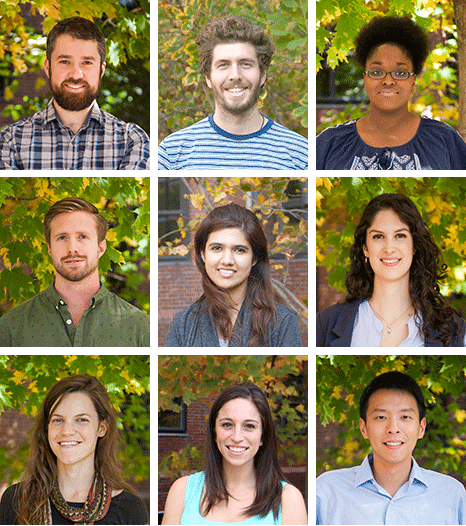Nine MCB graduate students have won fellowships to continue their research at Harvard. Jason Gehrke, Alexandra Mattei, and Alyson Ramirez have all won scholarships from the National Science Foundation (NSF); Monique Brewster and Megan Norris have earned fellowships from the National Institutes of Health (NIH); and James Angstman, Felix Barber, Saman Hussain, and Jun-Han Su have won fellowships through various foreign and domestic programs.
James Angstman from the Keith Joung Lab has won a National Defense Science and Engineering Graduate (NDSEG) Fellowship, sponsored by the U.S. Office of Naval Research (ONR). Angstman was an undergraduate at the University of Minnesota and joined the MCO in 2012. His research focuses on mammalian DNA methylation. Using programmable DNA binding domains, Angstman has been developing reagents that can erase specific methylation marks so as to causally link them to the expression of nearby genes. This work will help to more stringently define the regulatory role of DNA methylation in mammalian genomes and may even contribute to the treatment of diseases caused by abnormal methylation patterns.
Felix Barber has been awarded a fellowship from the William Georgetti Trust. Barber was an undergraduate student at Victoria University of Wellington, New Zealand and joined the MCO program in 2014 having just completed his Masters at Cambridge University. Presently he is studying differential growth within bacteria cell walls to assess whether a stress-coupled growth mechanism can explain recent experimental results. His interests also include neuroscience and the population genetics of cell colony expansions.
Monique Brewster from the Rachelle Gaudet Lab has won a fellowship from the National Institutes of Health (NIH). The Ruth L. Kirschstein National Research Service Award (NRSA) Individual Predoctoral Fellowship to Promote Diversity in Health-Related Research offers minority students mentored research training in order to prepare them for careers in biomedical, behavioral, or clinical research. Brewster was an undergraduate at MIT and joined the MCO program in 2010. She is studying TRPA1, a chemical- and temperature-activated ion channel expressed in pain-sensing neurons. Her work focuses on determining how TRPA1 responds to temperature on a molecular level.
Megan Norris from the Alexander Schier Lab has also earned a fellowship through the NIH’s Ruth L. Kirschstein Award. Norris was an undergraduate student at the University of Kansas and joined the MCO program in 2012. Her research focuses on the regulation of gastrulation, which morphologically rearranges an embryo during early development, laying the groundwork for the body axis and organ progenitors. Megan is focusing specifically on how the recently identified peptide Toddler, which is required during gastrulation, affects and directs the movement of early endodermal and mesodermal germ layers.
Jason Gehrke from the Joung Lab has been awarded a fellowship from the National Science Foundation. Gehrke was an undergraduate student at the University of California, Los Angeles and joined the MCO program in 2013. His research focuses on using an inactive Cas9 RNA-guided nuclease to direct epigenetic, site-specific modifications of chromatin without cleavage. This technique allows researchers to observe the effect of such specific modifications on transcription and chromatin metabolism. Jason’s work contributes to the Joung Lab’s use of Cas9 proteins and other artificially engineered nucleases in genome editing, which could someday yield therapeutic applications.
Alexandra Mattei has also earned a fellowship from the NSF. Mattei joined the MCO program this fall after graduating from Cornell University. Her work describes the molecular pathways through which seminal fluid proteins (SFPs) from male Drosophila influence female behavior after mating, causing an increase in feeding and a decrease in lifespan. Mattei plans to study SFP function through gene knockdown experiments and behavioral assays, which she hopes will lead to methods for controlling insect vectors of disease.
Alyson Ramirez has also been awarded a fellowship from the National Science Foundation (NSF). Ramirez was an undergraduate student at UCLA and joined the MCO program in the fall of 2014. She is interested in understanding the role transcription factors play in the specification of spinal motor neurons from progenitor cells.
Saman Hussain from the Ethan Garner Lab has won an International Student Research Fellowship from the Howard Hughes Medical Institute. Hussain was an undergraduate student at the School of Science and Engineering, LUMS, Pakistan and joined the Engineering and Physical Biology program in 2012. Her research focuses on understanding how bacterial cells co-ordinate cell wall synthesis to grow in robust and reproducible cell shapes. Specifically, she is studying cell wall synthesis in a shape mutant of Bacillus subtilis. By understanding the mechanisms that define cell shape, Hussain’s work could provide potential targets for future antibiotics.
Jun-Han Su has been awarded a fellowship from Taiwan’s Ministry of Education. Su received an MPhil in Bioscience Enterprise from the University of Cambridge and an MD and BS in Physics from the National Taiwan University before joining the MCO program in 2014. He is broadly interested in the field of engineering and physical biology, especially questions that bear both basic and biomedical importance such as quantitative studies of the cytoskeleton and cell nucleus.


